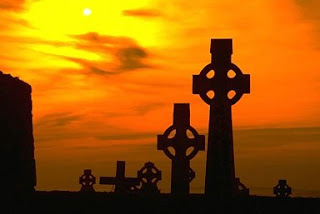In 998, all souls (the "faithful departed") were officially remembered in the Church's prayers on the evening of November 1, and with Masses for the dead on November 2. All Souls Day is now a feast of the universal Church. Following the Second Vatican Council, all Masses celebrated on All Saints day observe that feast, not "All souls".
We pray for the faithful departed, those baptized, but who need to be completely purified of all stain of sin before they come into full union with God in Heaven. This is most of us. The Church's teaching about Purgatory, the place of purification, is explained in the Catechism of the Catholic Church (§1030-1032):
"All who die in god's grace and friendship, but still imperfectly purified, are indeed assured of their eternal salvation; but after death they undergo purification so as to achieve the holiness necessary to enter heaven.
"The Church gives the name Purgatory to this final purification of the elect, which is entirely different from the punishment of the damned. The Church formulated her doctrine of faith on Purgatory especially at the Councils of Florence and Trent. The tradition of the Church, by reference to certain texts of Scripture, speaks of a cleansing fire:
"As for certain lesser faults, we must believe that, before the Final Judgment, there is a purifying fire. He who is truth says that whoever utters blasphemy against the Holy spirit will be pardoned neither in this age nor in the age to come. From this sentence we understand that certain offenses can be forgiven in this age, but certain others in the age to come.
"This teaching is also based on the practice of prayer for the dead, already mentioned in Sacred Scripture: 'Therefore [Judas Maccabeus' made atonement for the dead, that they might be delivered from their sin.' From the beginning the Church has honored the memory of the dead and offered prayers in suffrage for them, above all the Eucharistic sacrifice, so that, thus purified, they may attain the beatific vision of God. The Church also commends almsgiving, indulgences, and works of penance undertaken on behalf of the dead:
"Let us help and commemorate them. If Job's sons were purified by their father's sacrifice, why would we doubt that our offerings for the dead bring them some consolation? Let us not hesitate to help those who have died and to offer our prayers for them." [Saint John Chrysostom - 4th century]


No comments:
Post a Comment
While anyone can comment, a screening process is in place to prevent comments such as spams or obscenities. The best way to make certain your comment gets posted is to include your name.